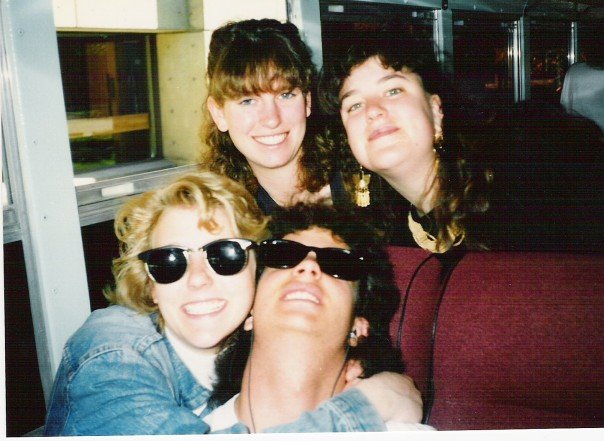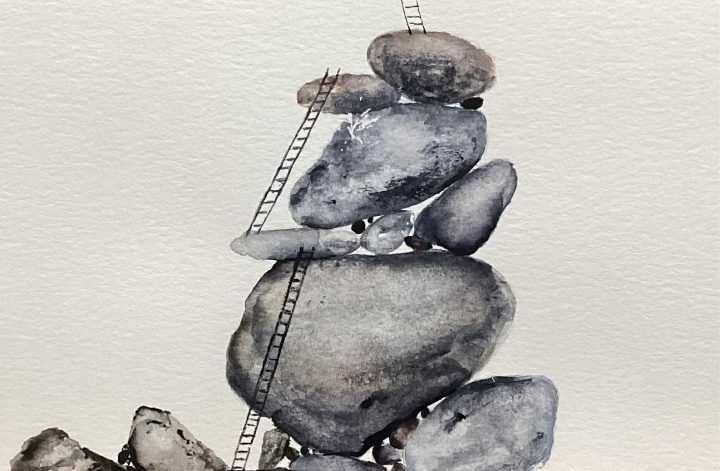My fiancé is a rock star.
You’ve probably never heard of him and that’s okay with him.
He is the best guitar player I’ve ever met. His dream was to do it for a living. Years ago, he moved to Calgary to pursue that vision. He played professionally in bands at night and sold guitars during the day. He wrote and recorded an album.
Then COVID hit, he lost his income and decided to move home to PEI. He has type 1 diabetes and needed to live somewhere his medication is publicly covered.
Today, Todd works as a business advisor for a bank and occasionally plays with a bunch of friends. He no longer makes an income from music.
But he is still a rock star.
“It’s who I am,” he told me recently. “I don’t need an audience to validate that.”
Todd measures success by asking “Would my teenage self be impressed with who I’ve become?”
Although he’s not touring internationally or flanked by groupies every night, his teenage self would be in awe of his skills. For Todd the answer is yes.
Would my teenage self be impressed with who I’ve become?
My 16-year old self fully expected to become the editor-in-chief of Cosmopolitan magazine.
To accompany the job, I’d have a huge loft in New York City where I’d throw fabulous parties for fashionistas, theatre people and other creative types and basically live the life that 12 years later would be ascribed to Carrie Bradshaw in Sex and the City.
I’d be powerful, popular, and – most importantly – not give a shit about Kevin Winters dumping me or Jerry Vasser bullying me, or any of the kids who labelled me a slut and shunned me in high school the year before.
In this fantasy, I’d bump into my tormentors on a trip home to Ottawa from Manhattan. They’d look sad and small in overalls covered in manure from their jobs as farm laborers while I, outfitted in Armani, would casually mention that I was top brass at one of best-selling magazines in the world and “didn’t high school seem so far away now?”
Where my fiancé’s teenage self wanted to master his skills, my teenage self wanted to be untouchable.
This is where ambition begins.
Earlier this week, I listened to Mel Robbins interview Gabor Maté, an expert in trauma and childhood development
“When children don’t get the attention that they need, guess what they develop?” he asked. “The need to be attractive so they can attract attention… all because they were not accepted for who they were.”
The same can be said for our culture’s other trappings of success: wealth, fame and status.
Feeling like you need to prove yourself – to your bullies, to your parents, or to the world at large – can be incredibly motivating. Some version of “I’ll show you all mo’fos!” has been the rallying cry of more than one workaholic at the top of their field.
But predicating success on someone else’s real or imagined assessment of you can be debilitating when things don’t go as planned.
I never became the editor-in-chief of Cosmo but I did spend years driven by the subliminal belief that only when I became a best-selling author or a six-figure earning entrepreneur or a world-renowned public speakerwould I achieve my purpose in life.
Fully believing the reason I’d been born was to reach the summit of the 1%, I worked incredible hard on these goals. When I achieved milestones along the way – publishing the book, getting my first clients, winning a speaking contest – I would celebrate briefly and then just as quickly feel like a failure: “Yeah but I’m still not there.”
But where is there?
In The Midnight Library by Matt Haig, the main character Nora, a music store clerk, experiences different versions of what her life might have become with different choices. After experiencing riches and fame in the multiverse, she discovers that all lives come with costs, and no life is ultimately any better than the one she has now.
As Chérie Carter-Scott says in the 10 Rules for Being Human “There is no better than here. When there becomes here, you will receive another there.”
In recent years, on the other side of middle age, and frankly, worn out from years of chasing elusive carrots on sticks, I’ve been wrestling with the possibility that those dreams of exceptional worldly success may never come true.
And, I’m starting to think that maybe that would be okay.
Would my teenage self be impressed with who I’ve become?
While this question works for my fiancé, in retrospect, it might not be the best question for me. After all, teenage me was pretty messed up – she’s probably not the best person to seek validation from at any age.
Unlike me, as a teenager, my fiancé’s sense of self worth wasn’t predicated on achieving greatness, it was to become great at what he did, and that in turn was simply an amplification of who he is.
“I am a rock star… it’s who I am.”
That statement says that no matter what happens, I have worth. I matter… to me.
I am writer, a speaker and a guide… that’s who I am. And the more I focus on the process and practice of doing those things and let go of any expected outcome from them, the happier I am.
Doing these things adds value to my life, but I am not valuable because I do them: I am valuable because I am.
And that’s enough.



